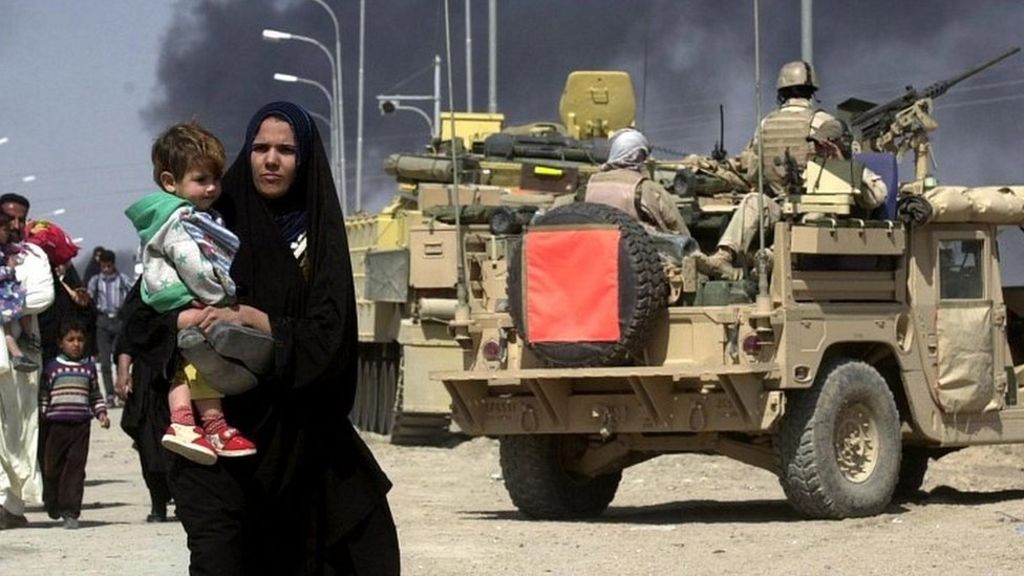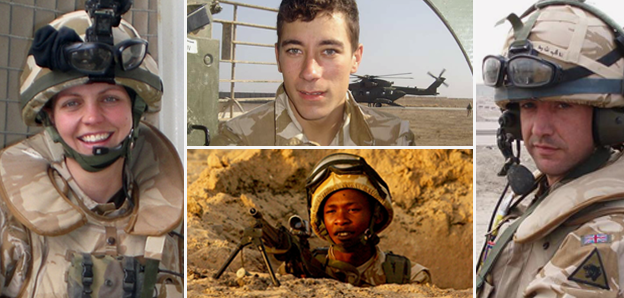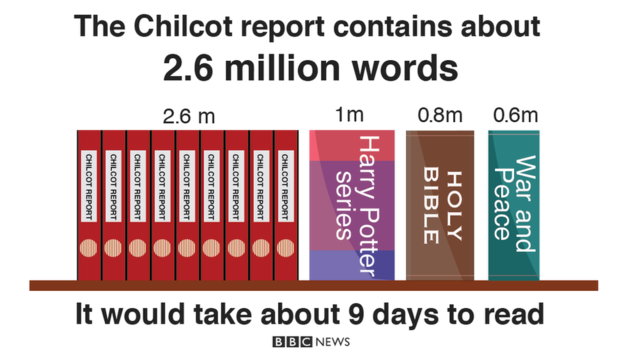Iraq Inquiry: Chilcot says ‘careful analysis needed before war’

The chairman of the UK's inquiry into the Iraq war says he hopes future military action on such a scale will only be possible with more careful analysis and political judgement.
His 12-volume report on the Iraq war is due to be released later — more than seven years after the inquiry began.
Sir John Chilcot told the BBC it would criticise individuals and institutions.
He said he hoped it would help answer some questions for families of the 179 Britons who died between 2003 and 2009.
The US, which led the intervention in 2003, lost 4,487 service personnel in the war.
Figures about Iraqi deaths vary from 90,000 to more than 600,000.
The war ended Saddam Hussein's regime in Iraq, but the aftermath unleashed sectarian violence that has killed thousands since then.
The worst attack happened last weekend when so-called Islamic State militants — who control swathes of Iraq and Syria — launched a suicide bombing in the Iraqi capital, Baghdad, killing more than 250 people.
Sir John said: "The main expectation that I have is that it will not be possible in future to engage in a military or indeed a diplomatic endeavour on such a scale and of such gravity without really careful challenge analysis and assessment and collective political judgement being applied to it.
"There are many lessons in the report but that probably is the central one for the future."
The former top civil servant said he believed it was a "reliable account" of the decisions that led to the UK's participation in the US-led invasion of Iraq, which toppled the regime of Saddam Hussein, and its aftermath.
Asked why the report — which was meant to have taken a year to complete and is 2.6 million words long — had taken so long to write, Sir John said it had been an "absolute massive" undertaking.
The then Labour prime minister Tony Blair's decision to commit British troops to the invasion, following a vote authorising military action in the House of Commons, was one of the most controversial foreign policy decisions of the past 50 years.
Mr Blair was one of more than 100 witnesses to give evidence to the inquiry, appearing before the panel twice, and the report will include details of declassified Cabinet papers, intelligence assessments of Iraq's weapons capability and private correspondence between Mr Blair and the then US president George W Bush relating to the conflict and the basis for the military intervention.
The report has been handed to Prime Minister David Cameron and will be available online on the Iraq Inquiry website once Sir John has finished making a statement setting out its findings on Wednesday morning.
The relatives of British troops and civilians killed in Iraq are being given access to the report prior to its publication although some are boycotting the occasion believing it will be a whitewash.
'High expectations'
Sir John told the BBC the relatives had been "very much in our mind" throughout the process and had been "invaluable in helping to shape the report and where it would lead".
"I have been very conscious from the start that the families have high expectations and wish to know the truth of all that happened, in particular where their relatives were affected.
"I hope they will feel when they see the report that the broad questions they have in mind will have been, if not resolved, answered to the best of our ability.
"But the key point I would like to make is by revealing all the base of evidence we have, they can see our conclusions and why we have reached them but they can make up their own minds on the basis of the evidence."
Arguments have raged since 2003 about the legal basis for the invasion although it is not clear whether the inquiry — whose specific remit was to give an account of what happened and to offer lessons for the future — will make a judgement on the issue.
UK military fatalities
But Sir John insisted criticism would be levelled at key figures where it was merited on the basis of a "rigorous" assessment of the evidence.
"We didn't set out to criticise individuals from the outset," he said. "We are not a court or a judge and jury.
"On the other hand I made very clear from the start when I launched the inquiry that if we came across things which deserved criticism, of individuals or institutions, we would not shy away from making them and indeed we have."
Mr Blair has, on numerous occasions, defended his decision to commit British troops, saying he would do so again in the face of what he said was a serious threat posed by Saddam Hussein.
'Grubby little war'
But he has since "apologised" for what he has said were deficiencies in the intelligence about whether Iraq possessed weapons of mass destruction and was able to use them.
He has also acknowledged there were shortcomings in post-war planning and a failure to anticipate the years of violence and bloodshed that ensued following the dismantling of the Iraqi army and other institutions.
Mr Blair is expected to face fresh calls to apologise from political opponents of the war and the relatives of those who were killed during the six years in which British troops were based on Iraqi soil.
Reg Keys, whose son Tom was killed in Iraq four days before his 21st birthday, told BBC Radio 5 live it had been a "grubby little war" and he believed Mr Blair had misled Parliament and the public.
'Collective judgement'
Sir John said although witnesses — who also included top military commanders, diplomats, lawyers and UN weapons inspectors — were not required to give evidence on oath, there had been no attempt to "cover up, hide or duck the issues".
Accepting the report had taken a lot longer to complete than originally envisaged, he said the panel had had to "assemble, assess and analyse" 150,000 government documents and reach conclusions about the lessons they offered.
"The scale of the task proved to be absolutely massive," he added.
The report will be released shortly before Prime Minister's Questions at midday and will dominate the exchanges between the party leaders.
David Cameron voted for the war while he was a backbencher but Labour leader Jeremy Corbyn was an implacable opponent and was one of nearly 140 Labour MPs who opposed the decision to go to war. MPs will get to debate the report in full on Thursday.
Политика конфиденциальности | Правила пользования сайтом









